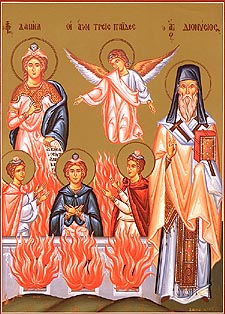|
|||
|---|---|---|---|
| This weekly bulletin insert complements the curriculum published by the Department of Christian Education of the Orthodox Church in America. This and many other Christian Education resources are available at http://dce.oca.org. | |||

The Prophet Daniel and his companions, the three Holy Youths Ananias, Azarias and Misael faced many temptations. The four boys lived at the time of a great tragedy—the conquest of the Kingdom of Judah by the Babylonian Empire. The four were among the masses of Jews who were taken away into exile, in what we know as the "Babylonian Captivity." Attractive and intelligent, they were chosen to be trained for service in the court of King Nebuchadnezzar. But in spite of intense indoctrination in the language and philosophy of their captives, these four refused to worship the gods of the Babylonians. They were given beautiful clothes, food from the royal table, and other special privileges. Nothing could make them abandon their faith in the God they knew. Our children and young people face their own challenges. In our culture, full of temptations to abandon that faith, are there ways in which parents and families can help children be strong in the Orthodox faith? A notable book answers "yes." Elizabeth White's "Following a Sacred Path: Raising Godly Children" (Ancient Faith Publishing, Chesterton, Indiana 2013) presents methods and activities to nourish a strong faith in a child, so that he or she will stay on that "sacred path" for life. The author is a Montessori teacher, and is also trained in the use of the "Catechesis of the Good Shepherd" program. As she writes, the parable of the Good Shepherd is an especially appealing and important one for young children, who need to feel that they are loved and protected by someone they can completely trust. Each chapter of the book begins with a quotation from an educator or from Scripture. This is followed by a list of three or four objectives—things the reader should realize after finishing the chapter. At the end of the chapter are suggested activities, based on the chapter's contents. One chapter discusses the seven gifts of the Holy Spirit enumerated in Isaiah 11: 1-2. The author offers ways to present them to a child. In another chapter, she advises parents and teachers to ask questions that will encourage children to think and work out answers, rather than cutting off thinking by giving answers. 
The book reflects admirable compassion for all kinds of people. For example, the author writes that her church school class creates Christmas cards to be given to homeless people at the parish's Christmas dinner. She asks her young students not to include a cheery message in their cards because writing something like "Have a great Christmas" would "only serve as a reminder that Christmas is not so great" for the homeless. Instead, she writes a note that tells the recipient, "We are keeping you in our prayers." Elizabeth White took a survey as she began her writing, asking Orthodox parents what they felt was their primary goal. Her personal favorite response is this one: "To help the child fall in love with God." Her book can help parents and teachers accomplish that beautiful goal. |
|||
